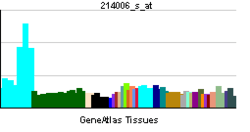Gamma-glutamyl carboxylase
| Gamma-glutamyl carboxylase | |||||||||||||
|---|---|---|---|---|---|---|---|---|---|---|---|---|---|
| Identifiers | |||||||||||||
| Symbols | GGCX ; VKCFD1 | ||||||||||||
| External IDs | OMIM: 137167 MGI: 1927655 HomoloGene: 639 IUPHAR: 1268 ChEMBL: 2012 GeneCards: GGCX Gene | ||||||||||||
| EC number | 4.1.1.90 | ||||||||||||
| |||||||||||||
| RNA expression pattern | |||||||||||||
 | |||||||||||||
 | |||||||||||||
| More reference expression data | |||||||||||||
| Orthologs | |||||||||||||
| Species | Human | Mouse | |||||||||||
| Entrez | 2677 | 56316 | |||||||||||
| Ensembl | ENSG00000115486 | ENSMUSG00000053460 | |||||||||||
| UniProt | P38435 | Q9QYC7 | |||||||||||
| RefSeq (mRNA) | NM_000821 | NM_019802 | |||||||||||
| RefSeq (protein) | NP_000812 | NP_062776 | |||||||||||
| Location (UCSC) | Chr 2: 85.77 – 85.79 Mb | Chr 6: 72.41 – 72.43 Mb | |||||||||||
| PubMed search | |||||||||||||
Gamma-glutamyl carboxylase is an enzyme that in humans is encoded by the GGCX gene, located on chromosome 2 at 2p12.[1]
Function
Gamma-glutamyl carboxylase is an enzyme that catalyzes the posttranslational modification of vitamin K-dependent proteins. Many of these vitamin K-dependent proteins are involved in coagulation so the function of the encoded enzyme is essential for hemostasis.[2] Most gla domain-containing proteins depend on this carboxylation reaction for posttranslational modification.[3] In humans, the gamma-glutamyl carboxylase enzyme is most highly expressed in the liver.
Catalytic reaction
Gamma-glutamyl carboxylase oxidizes Vitamin K hydroquinone to Vitamin K 2,3 epoxide, while simultaneously adding CO2 to protein-bound glutamic acid (abbreviation = Glu) to form gamma-carboxyglutamic acid (also called gamma-carboxyglutamate, abbreviation = Gla). The carboxylation reaction will only proceed if the carboxylase enzyme is able to oxidize vitamin K hydroquinone to vitamin K epoxide at the same time; the carboxylation and epoxidation reactions are said to be coupled reactions.[4][5][6]
Clinical significance
Mutations in this gene are associated with vitamin K-dependent coagulation defect and PXE-like disorder with multiple coagulation factor deficiency.[2][7]
See also
- Carboxyglutamate
References
- ↑ Wu SM, Cheung WF, Frazier D, Stafford DW (December 1991). "Cloning and expression of the cDNA for human gamma-glutamyl carboxylase". Science 254 (5038): 1634–6. doi:10.1126/science.1749935. PMID 1749935.
- ↑ 2.0 2.1 "Entrez Gene: GGCX".
- ↑ Brenner B, Tavori S, Zivelin A, Keller CB, Suttie JW, Tatarsky I, Seligsohn U (August 1990). "Hereditary deficiency of all vitamin K-dependent procoagulants and anticoagulants". Br. J. Haematol. 75 (4): 537–42. doi:10.1111/j.1365-2141.1990.tb07795.x. PMID 2145029.
- ↑ Suttie JW (1985). "Vitamin K-dependent carboxylase". Annu. Rev. Biochem. 54 (1): 459–77. doi:10.1146/annurev.bi.54.070185.002331. PMID 3896125.
- ↑ Presnell SR, Stafford DW (2002). "The vitamin K-dependent carboxylase". Thromb. Haemost. 87 (6): 937–46. PMID 12083499.
- ↑ Silva PJ, Ramos MJ (2007). "Reaction mechanism of the vitamin K-dependent glutamate carboxylase: a computational study". J Phys Chem B 111 (44): 12883–7. doi:10.1021/jp0738208. PMID 17935315.
- ↑ Vanakker OM, Martin L, Gheduzzi D, Leroy BP, Loeys BL, Guerci VI, Matthys D, Terry SF, Coucke PJ, Pasquali-Ronchetti I, De Paepe A (March 2007). "Pseudoxanthoma elasticum-like phenotype with cutis laxa and multiple coagulation factor deficiency represents a separate genetic entity". J. Invest. Dermatol. 127 (3): 581–7. doi:10.1038/sj.jid.5700610. PMID 17110937.
Further reading
- Bandyopadhyay PK (2008). "Vitamin K-dependent gamma-glutamylcarboxylation: an ancient posttranslational modification". Vitam. Horm. 78: 157–84. doi:10.1016/S0083-6729(07)00008-8. PMID 18374194.
- Berkner KL (2008). "Vitamin K-dependent carboxylation". Vitam. Horm. 78: 131–56. doi:10.1016/S0083-6729(07)00007-6. PMID 18374193.
- Oldenburg J, Marinova M, Müller-Reible C, Watzka M (2008). "The vitamin K cycle". Vitam. Horm. 78: 35–62. doi:10.1016/S0083-6729(07)00003-9. PMID 18374189.
- Berkner KL (2005). "The vitamin K-dependent carboxylase". Annu. Rev. Nutr. 25 (1): 127–49. doi:10.1146/annurev.nutr.25.050304.092713. PMID 16011462.
- Zhang B, Ginsburg D (September 2004). "Familial multiple coagulation factor deficiencies: new biologic insight from rare genetic bleeding disorders". J. Thromb. Haemost. 2 (9): 1564–72. doi:10.1111/j.1538-7836.2004.00857.x. PMID 15333032.
- Wallin R, Hutson SM (July 2004). "Warfarin and the vitamin K-dependent gamma-carboxylation system". Trends Mol Med 10 (7): 299–302. doi:10.1016/j.molmed.2004.05.003. PMID 15242675.
- Berkner KL (August 2000). "The vitamin K-dependent carboxylase". J. Nutr. 130 (8): 1877–80. PMID 10917896.
- Presnell SR, Stafford DW (June 2002). "The vitamin K-dependent carboxylase". Thromb. Haemost. 87 (6): 937–46. PMID 12083499.
- Bender, David A. (2003). Nutritional biochemistry of the vitamins. Cambridge, UK: Cambridge University Press. ISBN 0-521-80388-8.
- Ball, George E. (2004). Vitamins: their role in the human body. Oxford: Blackwell Science. ISBN 0-632-06478-1.
- Combs, Gerald F. (1998). The vitamins: fundamental aspects in nutrition and health. Boston: Academic Press. ISBN 0-12-183492-1.
External links
- glutamyl carboxylase at the US National Library of Medicine Medical Subject Headings (MeSH)
This article incorporates text from the United States National Library of Medicine, which is in the public domain.